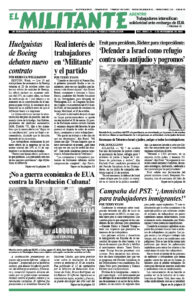The capitalist rulers of the Dominican Republic stepped up their crackdown on Haitian immigrants, announcing Oct. 2 they would deport 10,000 every week. Dominican President Luis Abinader demagogically claims this will defend the interests of “the Dominican people,” who, he says, are threatened by immigration from Haiti.
Abinader pledged to continue the weekly roundups, which if met could double the 250,000 Haitians expelled from the country in 2023. The measure is especially egregious given the thousands of Haitians who have recently sought safety across the border from the widespread and deadly gang violence there, and the economic and protracted political crisis that has engulfed the country.
Since June, the people of Haiti have faced foreign intervention from a Kenyan-led multinational police force, tasked with imposing “stability” and backed by Washington.
Every day of the first week after Abinader’s announcement, dozens of trucks arrived at border crossings filled with workers to be deported. Some 11,000 people were detained that week.
Many were Haitian-born workers who have lived their entire life in the Dominican Republic, but who still do not have legal resident status. There were also Dominicans of Haitian descent who have been denied citizenship and identity documents under the country’s draconian laws. And there were others who simply didn’t present their papers quick enough before they were thrown into the back of a police truck.
The government claims that “the human rights and dignity of the repatriated will be respected.” However, even people with legal documents are being deported. Many have been picked up on their way to work or arrested in nighttime raids, with their children left behind on their own. There are allegations of extortion by cops and soldiers demanding $200 to $300 even when someone has their papers in hand.
“It’s a kind of persecution against black people and against all those who are presumed to be Haitian,” said William Charpentier of the National Coalition for Migrations and Refugees.
“If you get picked up in the streets and don’t have your documents, you get taken to the Haina detention center and by 5 a.m. the next day you’re on your way to the border,” Jesús Núñez, national coordinator of the Sugarcane Workers Union (UTC), told the Militant. The organization is well-known for its involvement in fighting for pensions, health care and better working and living conditions for thousands of Dominican and Haitian cane cutters who toil on the country’s vast sugar plantations.
Many of those detained were from the eastern province of La Romana, where there is a high concentration of Haitians working in construction and agriculture. Núñez explained that more than once the UTC has had to rescue members from the clutches of the police.
“We send a group after the bus to show the authorities these workers’ pay stubs and other documents demonstrating they work at the sugar mills,” Núñez said.
Far from looking after the interests of working people in the Dominican Republic, as Abinader claims, his mass deportations are aimed at fomenting divisions between Haitians and Dominicans in order to deepen the exploitation of all workers.
“Capitalists have one approach to the border,” Núñez said, “they set up businesses and use the cheap labor of workers with or without documents.
“They speak about needing tens of thousands of workers in construction, banana and poultry plants and other industries,” he said. “Instead of granting legal status to these workers, they keep them threatened with deportation. They whip up anti-immigrant sentiments.”
Capitalist politicians talk about “the burden” Haitian immigration creates for the Dominican Republic. “What burden?” Núñez said. “It’s the Haitian immigrants who are forced to live in miserable conditions.”
“The poultry plant owners build a shack a few meters away from the farm to house the workers, and they don’t allow their families to live with them,” he said. “Dominicans don’t accept those conditions, and leave.”
Similar things happen in construction. Bosses “allow” some workers to “live” on the construction sites and save themselves from hiring security guards, he said. “Big farm owners have Haitian workers looking after the farm in exchange for ‘living there.’”
The capitalist rulers’ anti-immigrant campaign — in the Dominican Republic and elsewhere — seeks to mask the fact that the lack of adequate health care, schools and other services is because the wealth produced by all workers — native- and foreign-born — is pocketed by the billionaire capitalist families who force low wages, high rents and other sacrifices onto working people.
Núñez pointed to the need for the labor movement in the Dominican Republic to speak out against the prejudice against Haitians, and to take on the challenge of organizing Haitian and Dominican workers to fight together in their common interests.
“The Sugarcane Workers Union defends the right to a good job, a livable wage and access to health care for all,” he said.

